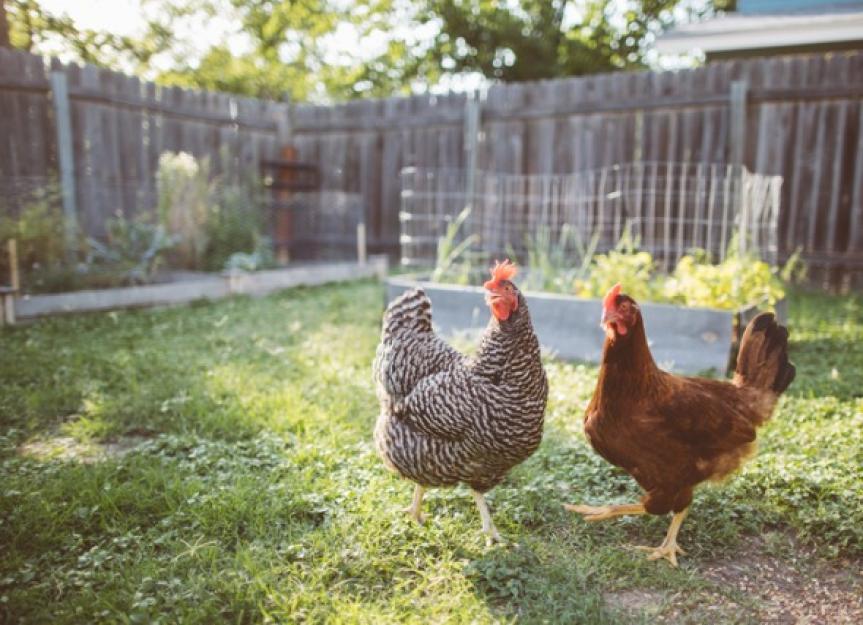Backyard chickens are extremely popular as pets, even in urban areas. They are fun, interactive, entertaining animals that have the added benefit of providing tasty, fresh eggs.
While chickens can be wonderful pets, their care isn’t simple. They actually have very specific needs that, if not met, can lead to a host of health problems. What should a prospective owner know before getting a backyard chicken?
Types of Backyard Chickens
Chickens come in more than 400 varieties, with standard chickens being larger and more common, while Bantams are much smaller, weighing only 1-2 pounds. Standard chickens are kept typically for their egg-laying abilities, while Bantams are generally chosen for show.
Chickens vary not only in size but also in feather color, length and pattern. Some also lay different-colored eggs, including pink, green and blue eggs, in addition to the familiar brown and white eggs found in grocery stores.
Things to Consider Before Getting Backyard Chickens
With their inquisitive, explorative nature, chickens are amusing to watch, and they make great companions, as they recognize their owners by sight and sound. Chickens can also teach children about the responsibilities of pet ownership, and all family members, including children, can participate in their care.
Although there are plenty of benefits to keeping chickens as pets, consider the following points about backyard chickens before you decide if you are ready.
Chickens Are Not Legal Everywhere
Before purchasing a chicken, you should check local laws to see whether chickens can be kept legally as pets in your area. Laws vary by state and by town, and not all locations are zoned for chickens. Many areas require chicken owners to have permits for ownership, and some towns even limit how many chickens can be kept as well as the size of the coop.
Chickens Require a Long-Term Commitment
While chickens typically lay eggs for only two to three years, they can live as long as 15 years. As a result, unfortunately, many unwanted backyard chickens are left in animal shelters across the country after their egg-laying years are over. So, if you’re looking for chickens more for companionship than for egg-laying capabilities, you may want to visit a local shelter before purchasing them at a hatchery or farm supply store.
Chickens Have Specific Housing Requirements
Chickens are appealing as pets to some people because many chicken coops are designed to look like decorative houses that are attractive additions to the yard. However, chickens have very particular housing needs, and some of these designer coops are not constructed to meet these needs.
Chickens Need Sunlight
For example, not all chicken coops are heated, yet chickens housed outdoors in cold climates need heat when it’s very cold so that they don’t get frostbitten. Similarly, chickens that are housed inside continuously over cold winters lack exposure to the sun’s ultraviolet (UV) rays, which are critical to helping them make vitamin D in their skin.
Vitamin D enables chickens to absorb calcium from their food so that they can make hard-shelled eggs. Without adequate UV light exposure, chickens often lay soft or shell-less eggs or have eggs get stuck inside of them when they try to lay—a life-threatening condition called egg-binding. This happens because their uterine muscles run out of the calcium needed to push the eggs out. Consequently, chickens living indoors in cold climates must have UV light bulbs built into their coops so that they don’t lay abnormal eggs or become egg-bound.
Chickens Need Nesting Boxes
In addition, chickens will only lay eggs if they are provided with boxes in which they can nest. Coops should have one box for every four to five chickens for optimal egg-laying. Nest boxes ideally should be placed in the least-trafficked part of the coop to prevent disturbing hens while they are laying, and they should be elevated 1-3 feet off the floor to prevent predators from jumping in them and debris from the coop floor collecting in them.
Nest boxes should be lined with bedding (pine shavings or straw hay) to keep chickens comfortable and to protect eggs once they are laid, and the boxes should be cleaned out regularly. Coops should be spot-cleaned daily and fully swept out weekly, and they should be placed outside in areas where the top layer of soil can be raked up and removed at least once a year. This prevents chickens from ingesting parasite eggs that are passed into the soil in their droppings and re-ingested, thereby perpetuating the parasite infection cycle.


.jpg)
No comments:
Post a Comment